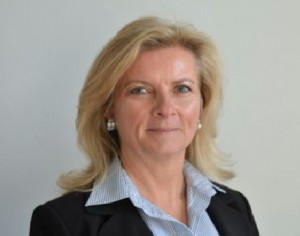
Heather Bailey, Executive Director of Energy Strategy and Electric Utility Development (photo from COB website)
At a talk on the evening of November 8 sponsored by PLAN-Boulder County, Clean Energy Action, and 350.org, Heather Bailey, Executive Director of Energy Strategy and Electric Utility Development for the City of Boulder, cautioned that a suit to condemn some or all of the local electrical distribution system of Xcel Energy would not be initiated until after the first quarter of 2013, if it is initiated at all.
Bailey reported that she and her colleagues have been engaged in intensive study and planning efforts in preparation for the potential creation of a municipal electrical utility. She said that she supervises a staff of only five to seven part-time city employees, but that she has assembled a team of outside experts, including volunteers, and has enlisted several stakeholder work groups.
She stated that a group of economists have been examining the “stranded costs,” for which the city would have to compensate Xcel, if the city establishes a municipal electrical utility. She defined “stranded costs” as electrical generation assets specifically built for Boulder and not yet amortized by Xcel. During the municipalization election in the fall of 2011, the company continually increased its assertions about the magnitude of its stranded costs, ultimately claiming that they would total hundreds of millions of dollars. Proponents of municipalization, on the other hand, contended that they would be relatively small in amount and quite possibly nothing at all. Bailey said that the city’s experts will present a range of “stranded costs” to the City Council.
Bailey said that another set of experts is studying the local distribution assets that Boulder would need to acquire from Xcel, if the city sets up its own electrical utility, and their cost. She indicated that she expected the estimates of stranded costs and the value of the necessary local distribution assets, as well as other vital information, to be publicly disclosed by January 21, 2013. Although Bailey did not expressly make this point, if the estimated capital costs of a municipal electrical utility, including the “stranded costs,” are too high, it would not be established, because its rates could not be the same as or lower than Xcel’s.
Bailey said that her immediate task was to propose a series of quantitative “metrics” to the City Council to help measure how the municipal electrical utility would meet the standards set forth in the ballot issues passed in 2011 (and subsequently codified in Article XIII of the City Charter). These standards include: rates that are the same or lower than Xcel’s, revenues that would equal or exceed 125 percent of debt service, reliability comparable to Xcel’s, and reductions in greenhouse gas emissions and increases in the percentage of renewable energy used to generate electricity. As an example of the problem, she noted that Xcel charges 28 different rates to its customers. She said that she will propose that a municipal electrical utility match Xcel’s average rate. (These “metrics” were presented to and approved by the City Council later in November.)
Bailey pointed out that Fort Collins, which runs a municipal electrical utility, has the highest-rated reliability in the state, and Longmont, another “muni,” the second-rated. She said that Xcel is rated relatively low in reliability. Bailey also observed that across the country municipal utilities generally charge lower rates than investor-owned utilities. Part of the reason for the lower rates, she admitted, is that municipal utilities are not obligated to pay taxes.
Bailey acknowledged that a Boulder municipal utility might not use a much higher percentage of renewable energy than Xcel, when (and if) it starts operation. But she said that the city was planning for the first 20 years of operations and that the percentage of renewable energy would increase significantly over time. Bailey predicted that the cost of solar energy will at some point be competitive with electricity generated by burning natural gas.
Bailey repeatedly emphasized that the process by which the city has considered and will consider forming an electrical utility has been and will be fair, transparent and honest. She pointed out that the figures and recommendations to be presented to the City Council in the first quarter of 2013 will be evaluated by independent, third-party experts.
Bailey commented that the traditional business structure of the electrical utility industry will not last indefinitely. She observed that Colorado’s utility regulatory system is antiquated. She said that Texas de-regulated its electrical utility industry ten years ago and has experienced significant increases in efficiency since then.
Bailey announced that the City Council will be briefed in detail on the staff’s past and future work on municipalization at a study session on December 11.




 (3 votes, average: 3.67 out of 5)
(3 votes, average: 3.67 out of 5)